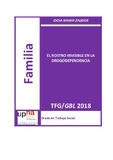Mostrar el registro sencillo del ítem
El rostro invisible en la drogodependencia
| dc.creator | Marín Zalbide, Idoia | es_ES |
| dc.date.accessioned | 2018-08-13T08:33:37Z | |
| dc.date.available | 2018-08-13T08:33:37Z | |
| dc.date.issued | 2018 | |
| dc.identifier.uri | https://hdl.handle.net/2454/29749 | |
| dc.description.abstract | La familia, institución encargada de la primera socialización de los/as hijos/as por antonomasia, se presenta como un núcleo de protección y proveedora de pautas de comportamiento que influirán posteriormente en el desarrollo cognitivo, emocional, relacional y afectivo de sus descendientes. La familia es pues, un lugar en donde sentirse protegido/a, pero esta realidad puede aparecer de manera dicotómica, como un escenario hostil para el adecuado desarrollo psicosocial de los hijos/as. Por ello, se ve interesante investigar acerca de las necesidades sentidas de estos/as hijos/as que hayan convivido con la figura paterno/maternal con problemas de drogodependencia. Objetivar las carencias que hayan sufrido a lo largo de su trayectoria vital y qué repercusiones o qué influencia ha tenido la vivencia de dicha problemática en los diferentes ámbitos y dimensiones de su vida, así como su capacidad de resiliencia. A su vez, analizar si se están realizando intervenciones desde los diferentes sistemas de protección en relación a las situaciones de estas personas. | es_ES |
| dc.description.abstract | The family, institution responsible for the first socialization of the children by excellence, is presented as a unit of protection and provider of behavioral guidelines that will later influence the cognitive, emotional, relational and affective development of their descendants. The family is therefore a place to feel protected, but this reality can appear in a dichotomous way, as a hostile setting for the proper psychosocial development of children. Therefore, it is interesting to investigate the felt needs of children who have lived with the father/mother with problems of drug dependence. Objectify the deficiencies that they have sustain throughout their life trajectory and what repercussions or what influence has had the experience of this problematic in the different aspects of their life, as well as their capacity for resilience. At the same time, analyze whether interventions are being carried out from different systems of protection in relation to the situations of these people. | es_ES |
| dc.format.mimetype | application/pdf | en |
| dc.language.iso | spa | en |
| dc.subject | Drogodependencia y parentalidad | es_ES |
| dc.subject | Terapia familiar sistémica | es_ES |
| dc.subject | Factores de riesgo y de protección | es_ES |
| dc.subject | Resiliencia | es_ES |
| dc.subject | Drugs and parents | es_ES |
| dc.subject | Systemic family therapy | es_ES |
| dc.subject | Risk factors and protection | es_ES |
| dc.subject | Resilience | es_ES |
| dc.title | El rostro invisible en la drogodependencia | es_ES |
| dc.type | Trabajo Fin de Grado/Gradu Amaierako Lana | es |
| dc.type | info:eu-repo/semantics/bachelorThesis | en |
| dc.date.updated | 2018-07-27T11:42:38Z | |
| dc.contributor.affiliation | Facultad de Ciencias Humanas y Sociales | es_ES |
| dc.contributor.affiliation | Giza eta Gizarte Zientzien Fakultatea | eu |
| dc.description.degree | Graduado o Graduada en Trabajo Social por la Universidad Pública de Navarra | es_ES |
| dc.description.degree | Gizarte Lanean Graduatua Nafarroako Unibertsitate Publikoan | eu |
| dc.rights.accessRights | Acceso abierto / Sarbide irekia | es |
| dc.rights.accessRights | info:eu-repo/semantics/openAccess | en |
| dc.contributor.advisorTFE | Arza Porras, Javier | es_ES |


